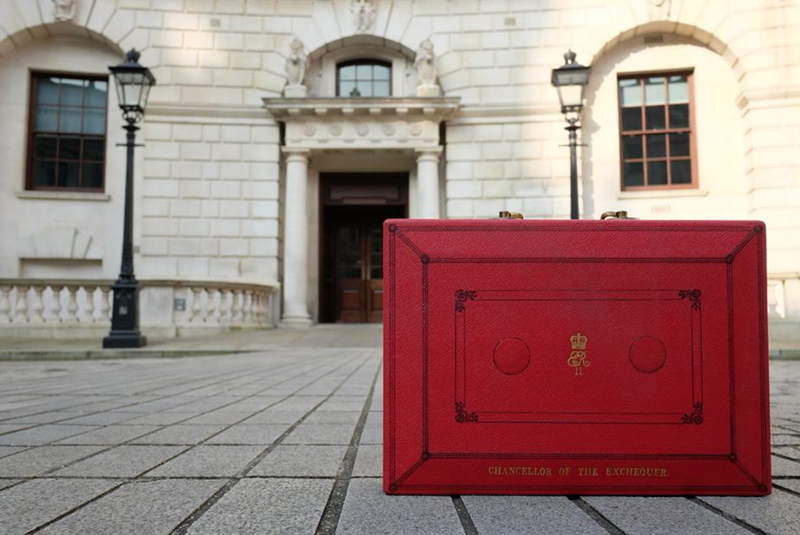
With comment from a number of the sector’s leading representative bodies including the BMF, FMB, RICS, BMA, CBA and BWF, PBM rounds-up of some of the industry responses to the 2020 Budget, delivered on March 11.
Builders Merchants Federation
Reacting to the Budget Statement, John Newcomb, Chief Executive of the BMF, said: “For understandable reasons, the Chancellor gave a wholly different Budget to Parliament than he had originally planned to when he took up the job a month ago. The threat posed by a coronavirus outbreak and the likely impact on the building materials’ supply chain is a hot topic among BMF members.
“A genuine worry is a downturn in the home improvement market, where projects are cancelled or postponed, because either the home-owner is confined at home, unable to work, or that their trade customers are unavailable if they have self-isolate.”
Mr Newcomb was disappointed not to hear more from Mr Sunak about investing in new buildings and existing properties to decarbonise homes on the road to a net zero carbon economy. He pointed out that household energy-efficiency was noticeable by its absence, both from his speech, and from the Budget Red Book.
He continued: “Promises to introduce schemes for heat pumps and renewable heating in 2022, however welcome, are too vague and insufficient for the task we all face. A package of incentives – including a cut in VAT to 5% for home improvements – was what the industry had called for to persuade and encourage residents to upgrade their home.
On housing, the BMF was pleased that the Affordable Housing programme will be boosted by a further £12 billion to build more much-needed social and affordable homes.
Elsewhere, promises to look again at improving the workings of the Apprenticeship Levy, the continued freeze of Fuel Duty, and more money to encourage the switch to using electric vehicles were all welcome developments, Mr Newcomb concluded.
Related: BMF outlines pre-Budget ‘asks’
Federation of Master Builders
Brian Berry, Chief Executive of the FMB, said: “Understandably, the Chancellor has delivered a ‘first aid Budget’ to overcome the short-term crisis caused by COVID-19. But he has missed an important opportunity to announce interventions that would support the sustainable, long-term recovery construction needs. The autumn Budget must include measures to cut VAT on repair and renovation, and a National Retrofit Strategy to promote decarbonisation and create jobs and growth.”
Commenting on measures to support businesses dealing with COVID-19, Brian said: “Builders are increasingly concerned about the impact COVID-19 will have on their businesses. Today’s package of measures to support SMEs through refunding Statutory Sick Pay, making temporary loans and grants available, and support for the self-employed will provide welcome relief to small building businesses and their workers alike.”
On red diesel, Brian continued: “While we understand the need to move away from red diesel in the long-term, it is unfair that construction should no longer be exempt while agriculture remains so. Construction contributes 9% to GDP and employs 2.7 million people, which does not appear to be recognised by the Chancellor. He must prioritise the development of a low-cost, low-carbon alternative to support SMEs of all sectors to tackle the climate crisis. Otherwise, the Chancellor is giving with one hand to SMEs and taking with the other.”
On housing, Brian concluded: “An investment of £13.7 billion in housing is welcome news, however, there was no mention of how the Government plan to support SME house builders. Master Builders are facing major barriers finding land, accessing finance and skilled workers – these will all need addressing if we are to build 300,000 homes a year.”
Royal Institution of Chartered Surveyors
Hew Edgar, Head of RICS UK Government Relations & City Strategy, said: “There is lots in today’s budget to applaud and the Chancellor has clearly been listening to RICS – particularly with the long term review of business rates which needs to happen quickly for firms to plan ahead, and the £1bn cladding remediation fund which will give more leaseholders and homeowners certainty and ensure where they live is safe.
“Levelling-up the country isn’t about what is said at the dispatch box, but the £600bn to be spent on new infrastructure stands to transform all parts of this country – however we must learn the lessons of projects like Heathrow and Cross Rail to ensure this is delivered effectively for taxpayers. Our professionals can help ensure projects that make a real difference to peoples’ lives are delivered on time and on budget.
“Delivering green, new housing required an ambitious approach to VAT – not superficial tweaks to stamp duty – so we’re disappointed the Chancellor didn’t support the property industry to retrofit thousands of buildings, turning them into places people would have loved to call home.”
Bathroom Manufacturers Association
The Bathroom Manufacturers Association has welcomed stimulus measures set out in Chancellor Rishi Sunak’s first budget. The trade body believes the large growth in spending will give consumers confidence and a lift for Bathroom Manufacturers after the temporary economic shock of coronavirus.
Along with a headline-grabbing £30billion package to help the economy cope with COVID-19 and a large stimulus package, the budget included specific measures which will help BMA members including an increase in R&D tax credits from 12 to 15%.
BMA Chief Executive Tom Reynolds said: “There was a sense of optimism in our sector early in the year, which does seem to have taken a dent due to coronavirus. The Chancellor’s package of emergency measures will be helpful to SMEs to weather the storm.
“The Chancellor was also right that the impact of the virus on the economy is temporary. The largescale investment announced in the budget statement, particularly on new housing and hospitals, will help to sector to recover some of its confidence.”
However, the association was not completely in praise of the budget. For a long time, the BMA has been calling for a VAT reduction on home improvements to encourage more bathroom upgrades, but this did not feature in the Chancellor’s fiscal programme.
Tom said: “A reduction in VAT for home improvements would have improved affordability in the replacement market, driving water efficiency and reducing the number of void homes. So, the Chancellor missed an opportunity in that respect.”
Concrete Block Association
Chris Stanley, Housing Manager at the Concrete Block Association, said: “We welcome the government’s commitment to big infrastructure, as it provides a welcome shot in the arm for the construction industry, which is starting to resurge following a turbulent few years. We urgently need to tackle issues such as housing, connectivity and local economies. These big projects, particularly a strategic plan to address our ageing road and rail networks, offer a catalyst which will hopefully drive activity to address these.
“However, looking beyond these statements, I fear that further investment of in vogue but unproven construction techniques and lack of support for existing methods/production will continue. It’s a huge disappointment for many established housebuilders, contractors and core building product manufacturers, many of whom provide significant economic benefit and employment opportunities across the UK.
“Many of our members continuously invest in developing their production to increase output, reduce manual handling and increase efficiency, all with limited or no financial backing from the government. Some of our members have expressed caution towards investing any further, as there appears to be no guarantee that Masonry is on the government’s construction and housebuilding agendas.
“Fundamentally, all members would happily invest if Masonry was on the agenda alongside other construction materials. Going forward, we need parity and clarity from government on this.”
British Woodworking Federation
On the introduction of a building safety fund, Helen Hewitt, CEO of the BWF said: “We welcome the government’s commitment to a £1bn building safety fund which will allow urgent work to be undertaken to make the UK’s housing safer. However, in order to safeguard millions of people, funding must also include provision for the replacement of fire doors as well as cladding removal.
“We know that a significant number of councils in the UK have yet to replace inadequate fire doors, and that a number of doors still in use do not satisfy the 30-minute burn time standard. This means that people remain at risk of fires spreading through the buildings they live in. The Government must support local authorities in replacing fire doors by providing central funding, and by giving clear and unambiguous guidance on fire door specification, maintenance and testing.”
Homebuilding stimulus packages (including social housing interest rate cuts, and funding for brownfield site building)
Helen Hewitt said: “Measures announced by the Chancellor today are an important boost to UK housebuilding, and presents a number of opportunities for the woodworking and joinery manufacturing sector which produces integral components including windows, doors and staircases. Using timber construction products the UK has an opportunity to become a sustainable construction global leader in the post-Brexit economy. Plus, there are associated cost savings across the lifespan of the buildings. Research from the Wood Window Alliance has showed that wood window frames made to their specification have an average life span of 60 years; that’s double that of their PVCu equivalents.”
£1.5bn funding boost to improve the condition of further education colleges
Helen said: “Our members look forward to contributing to the refurbishment of further education buildings and, as with housebuilding, there is a major opportunity for the UK to lead the way in the use of sustainable building products including timber.
“The investment in further education will also provide a boost to building provision in certain skilled trades, and support vital education and apprenticeship programmes that help develop the skills that are so vitally needed in the woodworking sector. We look forward to engaging in the National Skills Fund consultation in the spring, to help the Government and our industry tackle the ongoing skills shortage within the construction industry.”









